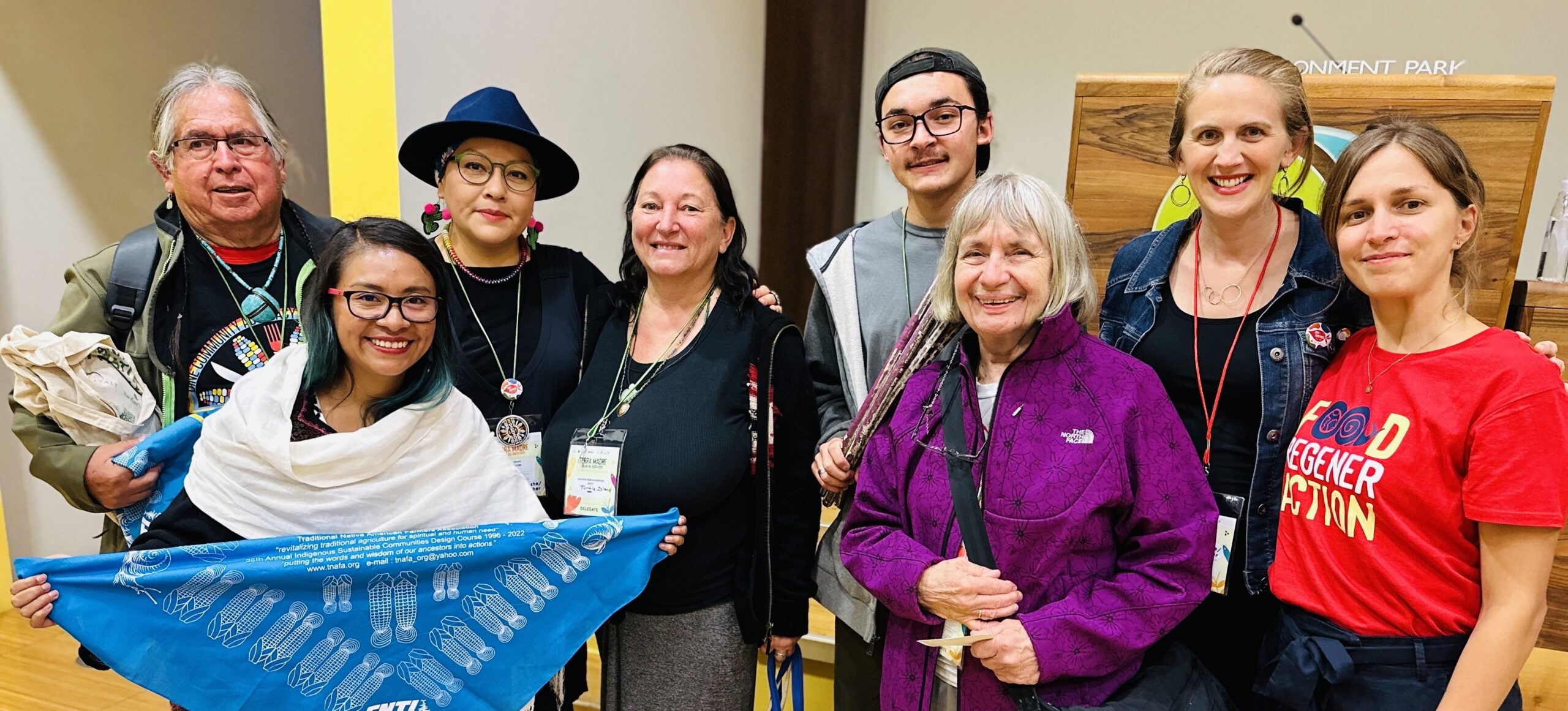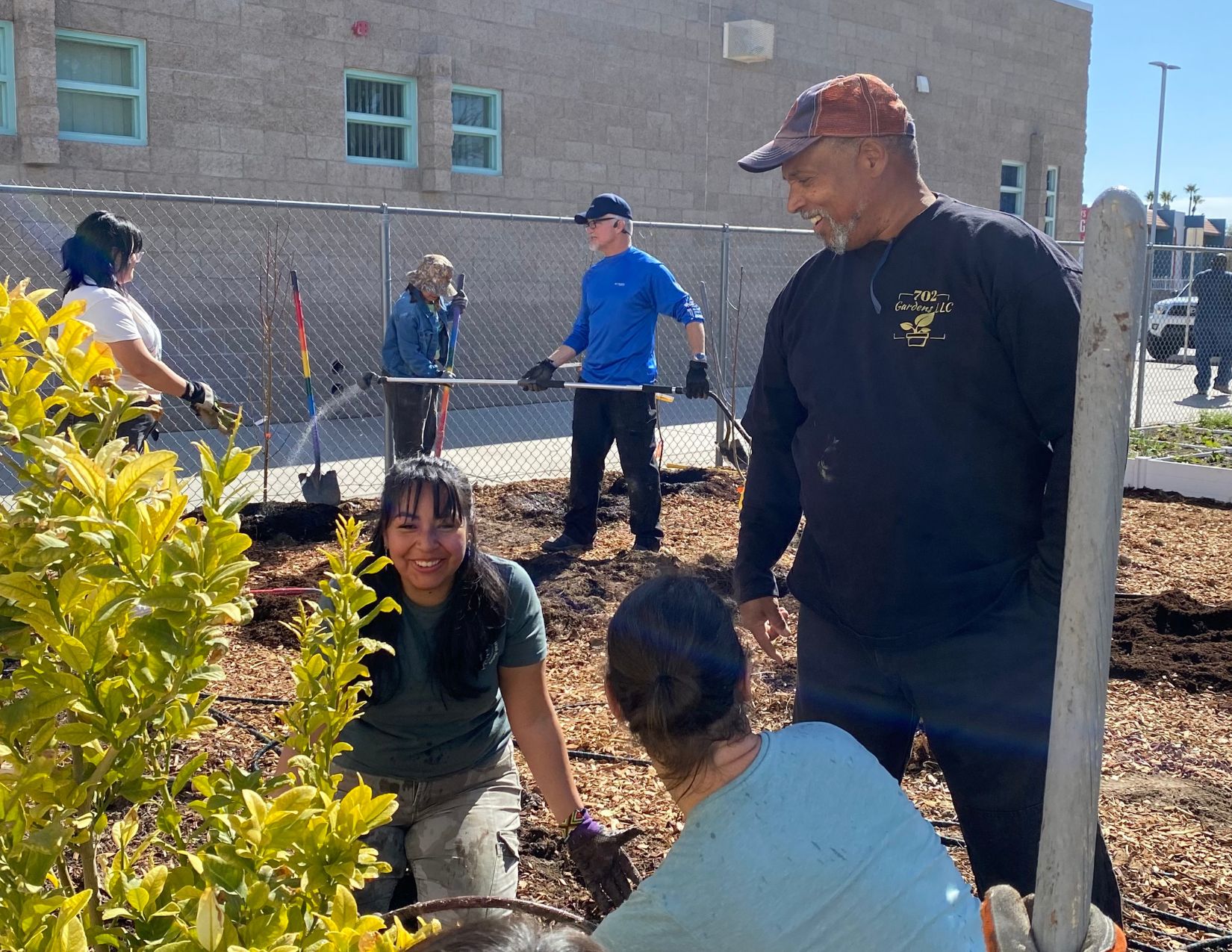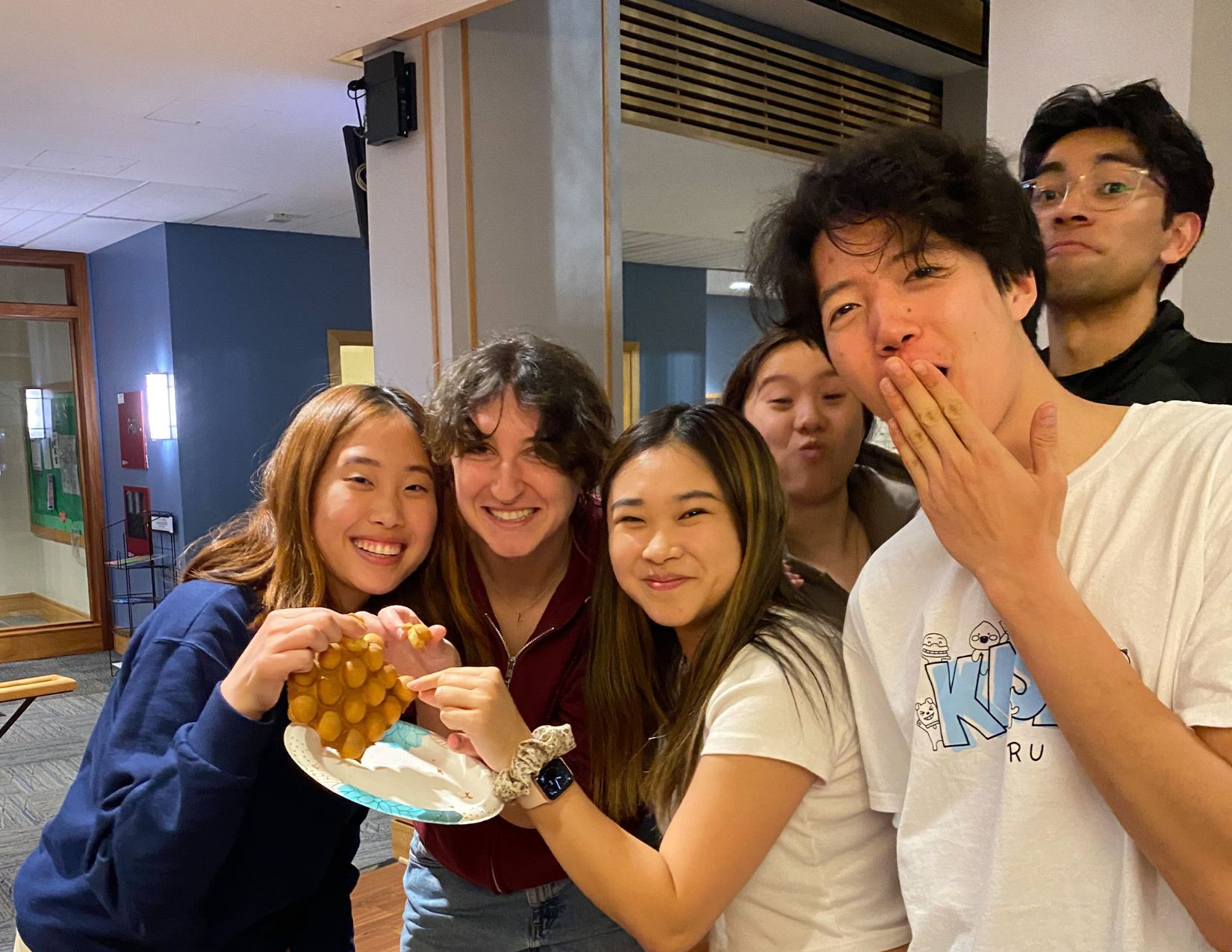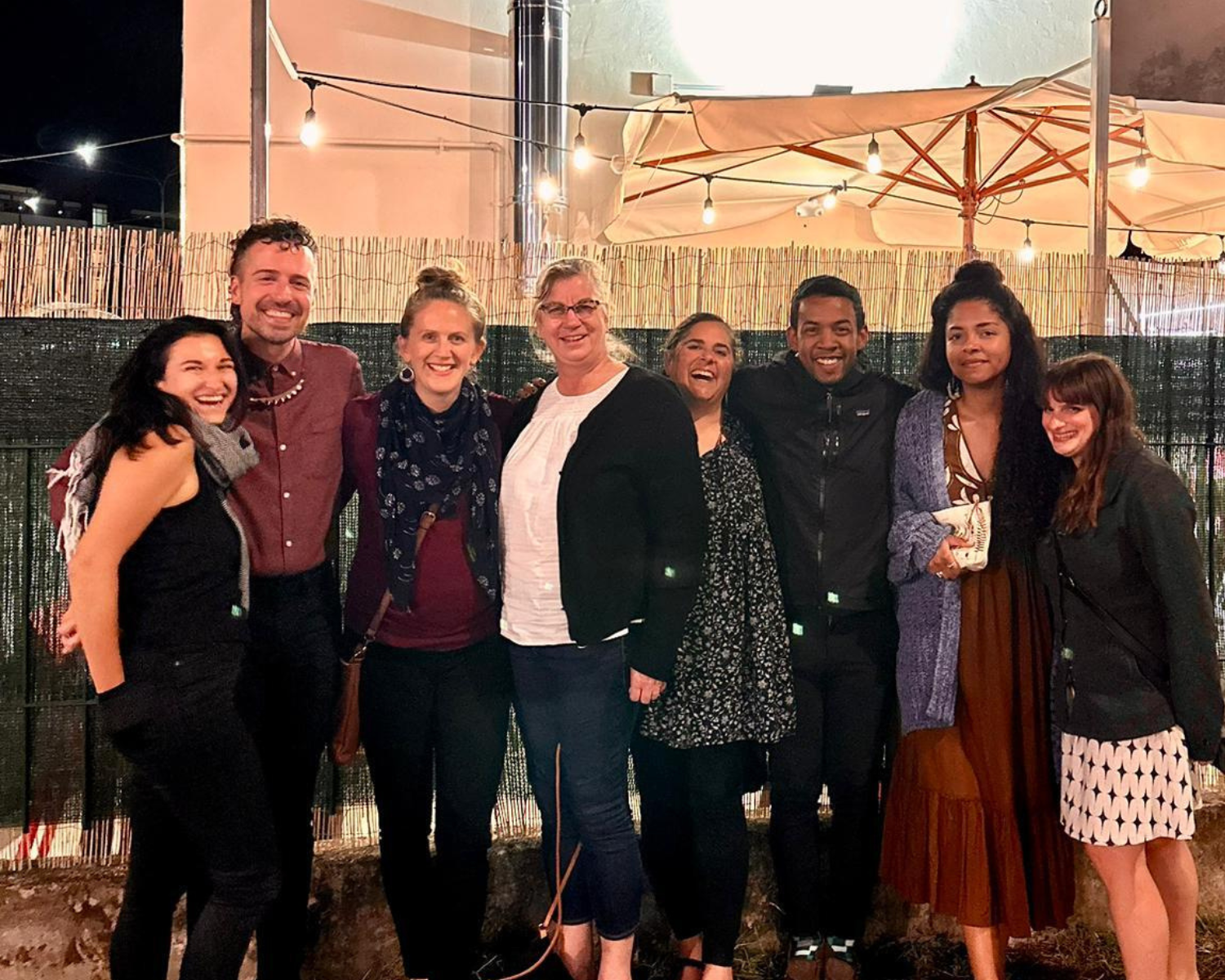REGENERATE!
2022 ANNUAL REPORT

Left: Leaders gather after the North America meeting at Terra Madre to celebrate cross-border collaboration. L-R Clayton Brascoupe, Dalí Nolasco Cruz, Denisa Livingston, Lorraine Gray, Mitchell Gray, Heather Pritchard, Anna Mulè, Marta Messa
A NOTE FROM EXECUTIVE DIRECTOR
anna mulè
Dear friends,
Last year across the globe, Slow Foodies held onto the word Regenerate as we all sought to understand how to emerge from COVID. Our world is in deep need for regeneration at many levels — from our relationships with one another, to the land and the seas, to our climate, to our communities and families.
The weight of all this need can feel like a crushing burden. But as you read the stories from the network below, you will see how food helps us lead with pleasure, and how pleasure actually brings us to solutions in climate, community and agriculture.
What if we designed policy based on nutrition, flavor and pleasure instead of unending financial growth and the personal priorities of those in power? This is our vision for joy combined with justice that motivates our chapters and community action teams to mobilize around biodiversity, education and advocacy in our communities — to pull up more chairs to the table and work for good, clean and fair food for all.
The Slow Food network is largely run by volunteers. Please join me in deepest thanks and appreciation to the hundreds of people who pour their hearts and souls into driving this movement forward. Thank you, members, donors and leaders for your partnership and collaboration!
Warmly,

Anna Mulè, Executive Director
explore the report

EMBRACING RACIAL EQUITY AND JUSTICE
Slow Food USA is dedicated to the development of an equitable, just, and healthy local food system that truly works for all of us. We encourage chapters to identify strategies and target resources to address the cause of those affected while continuously evaluating programmatic efficiency.
NATIONAL OFFICE ACTIONS IN 2022
SFUSA has been hard at work imagining how we can orient ourselves as an agent for the change we want to see in the world. Emerging from feedback from across the network, 2022 saw us delving head first into the Theory of Change process.
SFUSA delegates at Terra Madre 2022 participated in many panels, discussions, and demos, and started conversations with North American neighbors to start dissolving our political borders and engage in more programming with each other. Some of the outcomes of Terra Madre include the formation of the BIPOC Affinity group, a global LGBTQ2S+ group, and a commitment to deeper, sustained connections with Slow Food chapters across the Americas.
Slow Food Baltimore celebrates their region’s culinary heritage through a robust bi-monthly book club that showcases the beauty and zest of simple, multicultural traditions that are supported by delicious potluck discussions. Their community-facing programming takes an active approach to diversity and inclusion by rotating to a different neighborhood or region for each subsequent event.
Slow Food Vegas deepened its commitment to equity, inclusion and justice by supporting community gardens in low socioeconomic communities through volunteer work to maintain the spaces and by providing free seeds as well as information on the local growing schedule. This support is all done with the goal of encouraging the community to grow their own produce.
Slow Food East Bay explored the world of heirloom beans in a festival atmosphere with games, wine and community organizations. The chapter hand-picked six local chefs based on a set of criteria including a low public or social media exposure and a wide range of cultural backgrounds so that the “Bean Feed” could help catapult their careers through visibility at the event. The support for chefs also went on to include completion of city applications and permitting, health inspection requirements, and even providing volunteers to help as sous chefs and greeters at the event.
Slow Food Phoenix hosted a film screening on Slow Food Live focusing on finding new ways of securing food freedom and sovereignty. Following the videos, the main subjects and viewers participated in a discussion sparked by content in the films surrounding “Feeding Communities, Changing the Narrative.”
defending CULTURAL AND BIOLOGICAL DIVERSITY
In identifying good, clean and fair food for all, we encourage local ecosystems and promote healthy conditions for plants, animals, foods, and people to thrive. We nourish cultural and biological diversity.
NATIONAL OFFICE ACTIONS IN 2022
Slow Food USA hosted the 2022 Seed Summit, an international grassroots gathering over three thematic days of programming around seed sovereignty, preservation and community, with a special focus on women’s panel sessions, author readings, film screenings and moderated conversations. We also facilitated three live-interpreted panels organized by 11 Slow Food chapters in Mexico, the Caribbean and South America.roles. Growers, experts and activists met virtually to listen to a keynote address.
The Ark of Taste gained momentum in 2022 as regional committees started up after a pandemic-long hiatus, plus a new Ark of Taste committee formed in Hawaii. The living catalog boarded 22 new foods onto the Ark from the Northeast and Southeast regions. After contributions and collaboration across the network, the SFUSA Ark of Taste book was completed and sent to the publisher—it will officially be released in August 2023.
Slow Food NYC has donated over 640 lbs of locally grown food to surrounding community organizations and neighborhoods through their Urban Harvest program. Through community engagement, the harvest has provided beneficial nutrition while also giving people the opportunity to connect with foods that have cultural or familial significance to them; like the 70+lbs of harvested Callaloo that were then used in neighborhood kitchens.
Slow Food Metro North NY brought the community together with a “Ramp Dance Party & Potluck”. Those who gathered shared homemade food, incorporating ramps that they harvested from a volunteer’s ramp patch. They nourished diversity by sharing experience and knowledge about indigenous edible plants. There was even ramp vodka!
Slow Food Columbus hosted a panel discussion exploring The Choices We Make when it comes to consuming meat. Representation of opinion on the matter included diverse viewpoints, from advocating for meat consumption to supporting a vegan diet.
Increasing access to nutrition
Developing culturally appropriate strategies for supporting healthier food choice options provides a better food environment for the supplier and the consumer. These opportunities also contribute to the local economic impact and future options for policy work to permanently support the nutrition of our communities.
NATIONAL OFFICE ACTIONS IN 2022
The Plant a Seed campaign shifted gears in 2022 to focus on one crop – this year on beans, highlighting biodiversity within that crop group and using beans to talk about the big themes of nutrition, climate and food sovereignty. All 750 kits created with 6 Ark of Taste bean varieties were claimed in only 5 weeks! The campaign culminated in celebratory bean suppers across the country, one in each region. Each supper had its own format, highlighting the uniqueness of each Slow Food host chapter.
Slow Food Land & Sea (Friday Harbor, WA) worked with volunteers at their Learning Garden, developing what was once a parking area to become a resource for learning, teaching and sharing for all ages from student groups. The harvest of flowers (both pollinator and edible) and heritage and Ark of Taste crops is donated to local residents who receive various social services. The space is host to many pollinators and wildlife and provides a space for community members to nourish their soul as well as their bodies.
Slow Food in the Tetons distributed $50,000 worth of discounts through their Local Food Discount Program. Support is offered to “anyone who finds cost to be a barrier to buying local food” at the Winter Farmers Market, Farm Stand and Online Marketplace. Through a sliding scale payment system, customers were given the opportunity to select a 0%, 10%, 25% or 50% discount on their food purchases. The Local Food Discount Program has been extremely successful in increasing access to local delicious and nutritious food in the community.
Slow Food Beaumont members have hosted a monthly fresh produce market stand for the past eight years, serving local low-income neighborhood residents living in a food desert. Most of the produce is sourced from the Beaumont Farmers’ Market, and it is all sold at only 50 cents a pound! In the event that any of the produce is not sold, it is donated to a local non-profit soup kitchen called Some Other Place.
Slow Food Bluegrass continued hosting their annual Ark of Taste event. The event focuses on removing barriers for food equity and access, and mitigating food deserts in the community. Local chefs come together to create a four course meal with proceeds benefiting Louisville Community Grocery, a cooperatively-owned grocery store.
Educating, inspiring and mobilizing CITIZENS
By creating meaningful opportunities of civic engagement through inspiring programs and a variety of educational opportunities, people of all ages are then motivated to advocate for a Slow future.
NATIONAL OFFICE ACTIONS IN 2022
Slow Food USA hosted a National Leader Summit that included 22 sessions over 2 weekends. The well attended schedule included topics covering programming, fundraising as well as marketing and communications. The strategy session topics included a COVID roundtable, Theory of Change, Plant a Seed campaign overview and Setting Positive Intentions for the Coming Year With Your Chapter.
Snail of Approval grew by 73 awardees nationwide, bringing the total awards to 412 by the end of 2022. Chapter leaders collaborated to successfully update the local application process for the award. Slow Food USA hosted a social media campaign to bring awareness to women-owned businesses within the program.
The Slow Books team curated many lists on the Slow Food Bookshop.org site, including monthly recommendations, books to support programs like the Slow Seed Summit, and books aligned with monthly cultural awareness celebrations. The annual Network Wide Read pick, Grist, was a first for the group: a cookbook celebrating beans, aligned with the ‘beans’ theme for the Plant A Seed campaign. The read-a-long of Grist: A Practical Guide to Cooking Grains, Beans, Seeds, and Legumes by Abra Berens culminated in a Slow Food Live cooking demo and conversation with the author.
Slow Food Baton Rouge supports school gardens and the integration of gardens into the classroom curriculum where children grow herbs and vegetables and participate in taste tests with produce from their harvest. This provides children with an opportunity to learn life long skills regarding food literacy and the understanding of where food comes from. The gardens have become a hands-on science laboratory, extending the curriculum’s capacity.
Slow Food Houston teaches sustainable farming as Minecraft Educators through one-day day camp challenges with local game shops.
Slow Food Santa Fe continues to broadcast Food Out Loud in New Mexico with good, clean, fair programming that includes guests who are farmers, educators, and leaders in policy work.
Influencing policies in public and private sectors
We influence policies in public and private sectors. We activate our network to connect with legislators, corporations and communities to advocate for real, meaningful change to influence every aspect of the food chain.
NATIONAL OFFICE ACTIONS IN 2022
Slow Food USA hosted a bilingual Slow Food Live webinar, The Policy of Childhood Nutrition. This forum brought together child nutrition experts help our network advocate for federal policy that will be good, clean, and fair for all of our nation’s children.
Slow Fish received a major grant to support program development around sustainable seafood values. Members of the working group leveraged relationships with four Slow Food communities to plan programs in 2023 with a variety of formats. Slow Fish continued policy work, hosting a webinar to discuss the AQUAA Act and bringing together key voices on the ecological and socio-economic implications of this legislation.
Slow Food Boulder supported the successful campaign to pass Proposition E in Colorado. This legislation is a step toward bringing back free lunch in public schools.
Slow Food DC uses their newsletter to highlight opportunities for the community to participate in local food advocacy. Issues include school lunches, food insecurity among seniors, and prison meals. Newsletter content provides practical tools to either present testimony, submit written testimony, or call legislators.
Slow Food Whidbey Island centers their mission on connecting the community. Volunteers use their power as a nonprofit organization to amplify the voices of farmers and business owners who align with the Slow Food values.
Slow Food Denver organized affinity group conversations to seed camaraderie and big changes. Co-hosted with a partner organization, their Let’s Talk Food event was an engaging panel discussion that connected farmers and food producers around the joys and challenges of farming in Colorado.
Higher Education Highlights
College and University chapters have a unique opportunity to tailor the Slow Food mission to be applicable for campus life. By encouraging involvement from students, faculty, and food service providers, the school community has the potential to influence the greater community Slow progress.
Slow Food Case Western Reserve University hosted a speaker from the university’s campus food provider to educate members on how the school has implemented more environmentally sustainable practices in their business model. Following the presentation, the group brainstormed various sustainability initiatives for individuals and corporations. This discussion provided a catalyst for good, clean, fair policy work as it relates to college students.
Slow Food Emory developed a “Sunday Produce Initiative” that reduces food waste by collecting surplus produce from a weekly farmers’ market, gathers community through volunteer service work and provides healthy, nourishing food in a buffet-style gathering for cancer patients and their families at a community residence.
Slow Food University of Wisconsin – Madison is nourishing diversity with it’s many thriving initiatives with children, partnerships with guest chefs to create weekly dinners that showcase different cuisines and the versatility of homegrown Wisconsin foods, and a weekly cafe which all showcase different cuisines and the versatility of homegrown Wisconsin foods. The meals are now being offered in two different sustainable and equitable payment options that include “Pay What You Can” and “Pay It Forward.”
by the numbers


total members
plant a seed kits donated to school gardens
campus-based chapters
chapter in-person events
new members
snail of approval awardees
chapter partnerships
chapter virtual events
active chapters
Funds Redistributed to Chapters
chapter leaders and volunteers
people impacted by chapter programs
2022 financials
Our incredible network of members, volunteers and supporters is the foundation of all we do as Slow Food USA. We’re grateful to each and every person involved in this work!
Total revenue: $1,071,642
Donations: $463,998
Membership: $189,599
Corporate sponsorships: $47,333
Events: $29,985
Grants: $287,600
Program Fees: $46,128
Other: $6,999
Total expenses: $909,308
Programming: $744,124
Administration: $80,749
Fundraising: $84,435
MEET OUR MEMBERS AND DONORS
Tatiana Kaletsch, chapter leader
“Slow Food is about systems versus a structure. Being a member and a chapter leader our work as a network is about prevention and at the same time builds community connections and community well-being. Everyone can be part of this work, there are infinite ways to get involved and when you do, you become part of creating a better, healthier, and more just food system.”
Kate Gridley, Member
“I am an artist, a mother, and a vegetable gardener. I grew up in an urban area, but settled in a rural area at the age of sixteen. I always wanted to be more connected to the land. And so I am. For me, Slow Food is about reciprocity, thanksgiving, and family.”
Colehour Bondera, Member
“For me, Slow Food means being aware and making choices which are not costly to other species, or parts of my immediate ecological system. Everything must begin with where and how it is produced. We need to work together to support one another so that we can all make choices slowly and ensure that the benefits are not only for our individual self, but for the broader whole of the human community and the ecosystem; the whole of Mother Earth.”
BOARD OF DIRECTORS
AND STAFF

The Slow Food USA national team at Terra Madre in Torino Italy, 2022.
We’re deeply grateful for the many contributions our board of directors and national office staff make to the national and international movement toward good, clean and fair food for all!
Board of Directors
Alessandro d’Ansembourg
Ben Burkett
Bilal Sarwari
Julie Shaffer
Kate Krauss
Kathryn Underwood
Kevin Mitchell
Laura Luciano
Paolo di Croce
Shelu Patel
Taylor Pate
National office team
Anna Mulè
Brett Rapkin-Citrenbaum
Brian Solem
Cindy Zheng
Colles Stowell
Dan Mueller
Deion Jones
Eryn Kelly
Heidi Hedeker
Lauren Ruotolo
Makiah Josephson
Mara Welton
Marina Stylianou
Michelle DiMuzio
Olivia Haase
Patricia Hennessy
Stephanie Goldfien
Felix Wai
Joined in 2022
Left in 2022


